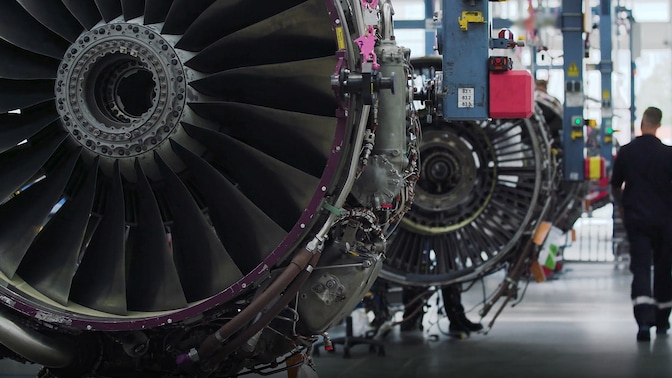Sustainability is the top benefit of the metaverse at work

Our recent ‘Metaverse at work’ research, in partnership with EY, saw sustainability consistently called out as the greatest benefit to businesses. Discover how this translates to different use cases and why sustainability is critical for the exponential potential of networks.
The metaverse conjures up many pictures. These usually involve gamers, social networking and interactive experiences. It’s far less likely to create a picture in our minds of present-day working environment.
And yet recent research conducted by EY and Nokia shows that the metaverse is already part of today’s business landscape - only 2% of respondents see the metaverse as a buzzword or fad – and it’s already helping to address some of the world’s most pressing environmental and social issues. Sustainability is the top ranked benefit for industrial and enterprise metaverse use cases, both for companies still in planning (41%) and more so for companies that have already deployed metaverse use cases (51%).
How is the metaverse helping businesses achieve their sustainability goals?
Sustainability is part of businesses Environmental, Social and Governance (ESG) strategies. Businesses measure and report on a range of environmental and social factors to demonstrate their progress towards net zero and equal opportunities. For publicly listed companies, and increasingly, private or limited liability companies, these sustainability reports are made available so shareholders, investors, governments and customers can see their ESG goals and achievements. These goals intersect with the metaverse as many of the digital technologies that are integral to the metaverse will enable more sustainable business operations.
From an environmental perspective, advanced connectivity (e.g., 5G private wireless) and digital technologies such as cloud computing, smart sensors, AI and machine learning can help to decrease energy consumption. Augmented/extended/virtual reality, autonomous robots or drones can increase productivity and efficiency (bits per watt of energy used) by substituting physical journeys and processes with virtual ones. All efforts to reduce energy consumption not only help reduce operating expenditure, but they will also help to reduce the level of carbon dioxide (C02) in the atmosphere. C02 is one of the greenhouse gases (GHG), along with other forms of waste, that are contributing to global warming. It's therefore important for companies to reduce the level of GHG coming from their business operations, as well as those emanating from their supply chain.
From a social perspective, co-development platforms, digital twin technology as well as the previously mentioned AR, XR and VR are part of creative, virtual toolkits that ensure the right experts can participate in business operations. The human centric social goals that help provide equality of opportunity (regardless of gender, age, education or location) is very well supported in a virtual world. Digital, virtual access can be scaled in a way that physical access cannot. This in turn means more people can have access to training and skills development, but also expert knowledge can be more accessible.
For example, during the pandemic, when travel and in person cooperation was limited, Lufthansa developed a Virtual Table Inspection of engine parts. Based on 5G private wireless connectivity, real-time high-resolution video streaming allowed virtual inspection of dismantled parts and enabled joint decision making about inspected components between colleagues spread across a wide geography. This meant that while lockdown measures were in place, Lufthansa could continue to run operations and avoid a backlog of requests.
Which metaverse uses cases will deliver the greatest sustainability benefits?
The EY-Nokia study covers four industry sectors - automotive; industrial goods and manufacturing; transportation, supply chain and logistics; and power and utilities. It also reviews four areas of the business value chain and maps them to 12 metaverse use cases.
Sustainability is identified as one of the top three business benefits in seven of these use cases. For three use cases, more than 60% of respondents ranked sustainability as the top benefit.
Autonomous/remote-controlled (RC) operations robotics (74%) is the use of autonomous or remote-controlled robots which can be deployed, controlled and/or monitored virtually to assist in the operations like manufacturing, surveillance, rearranging assets in facilities, loading, storage and retrieval, packaging, and more. By deploying, monitoring, and controlling operational robots in virtual environments, companies can streamline processes and create greater human oversight and intervention abilities.
Virtual office and workspaces (64%) include use of immersive digital environments in enterprise-level HR, onboarding and training processes for items like customer service training, general safety training, and company-wide programs on sustainability and diversity, equity and inclusion. The metaverse also offers the chance to create more collaborative and immersive workspaces.
XR-enhanced UX research (61%) refers to enhancing UX research using extended reality (XR) technology for eye tracking, overlaying virtual elements on the real world, user testing virtual prototypes (e.g., vehicles, machinery), for end users, intermediaries, and/or company employees. User testing in XR prior to production can limit waste and time lost compared to catching problems in physical testing or once products reach production.
Autonomous/remote-controlled (RC) maintenance robotics, visualized predictive maintenance, field XR and XR hands on training are four further use cases that rank sustainability second or third in their benefits list. They provide predictive maintenance and bring specialist help to remote locations that will help to extend the lifecycle of machines. There are also health and safety benefits for workers by ensuring that they are kept away from dangerous and difficult environments and better access to training and specialist support.
What next?
Industrial and enterprise metaverse use cases can deliver a raft of sustainability benefits to businesses including, but not limited to, greater energy savings; avoiding the waste of physical and human resources; reducing the volumes of materials going to landfill, and providing a safer, more inclusive, collaborative working environment for employees. Aside from the sustainability benefits, businesses could see themselves regarded more favorably by investors when they report improved ESG data, and they will be better placed should governments introduce ESG legislation. Consequently, it’s clear that the metaverse and the use cases it supports can play an important role in delivering a more sustainable future.
The metaverse at work surveyed 860 business leaders in the US, Brazil, the UK, Germany, Japan, and South Korea across four key industries: automotive, industrial goods and manufacturing, transportation, supply chain and logistics, and power and utilities. Conducted by EY teams in collaboration with Nokia, there are five reports available for download, covering the global findings along with one for each industry.




